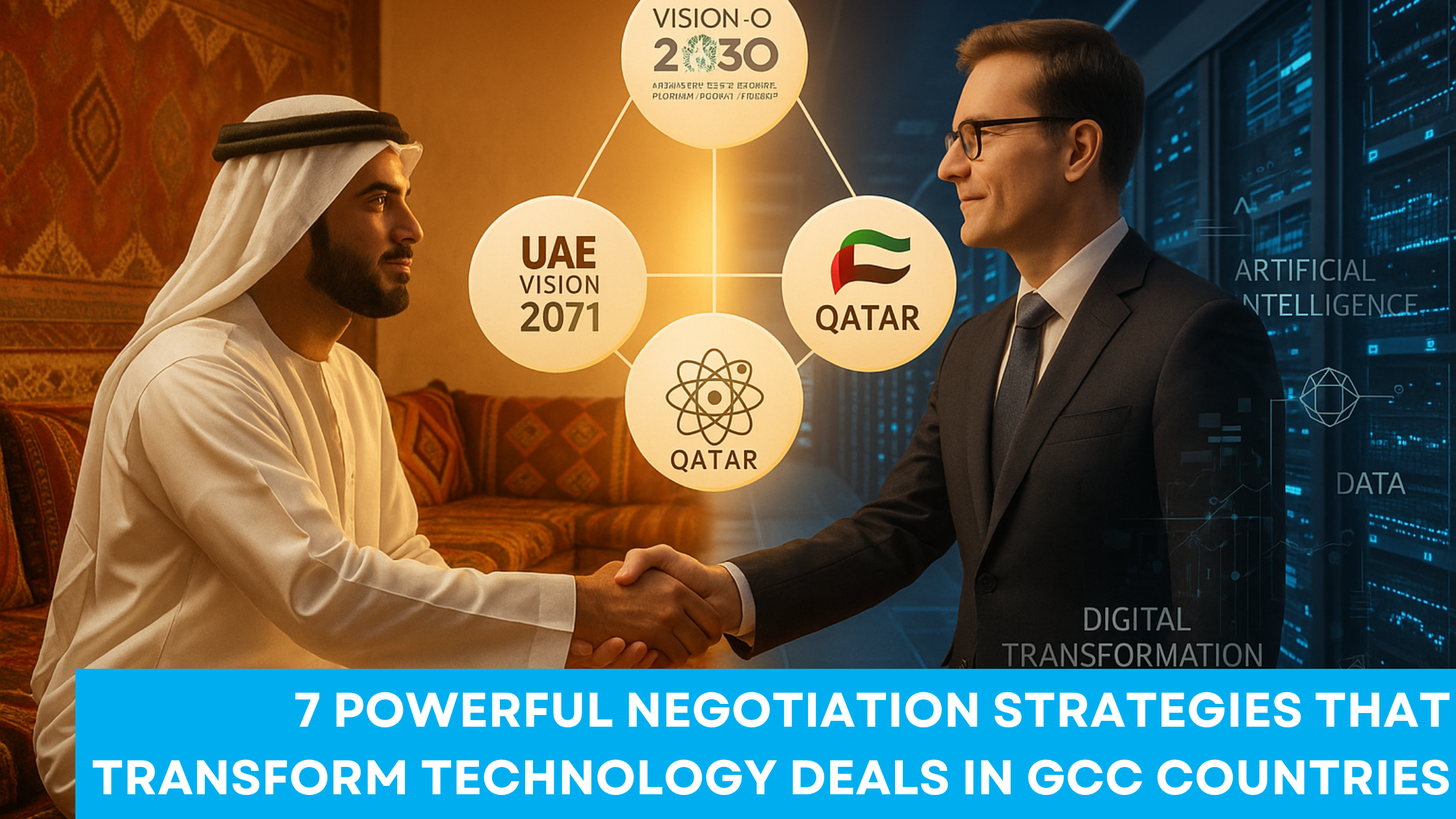Key Takeaways
- GCC countries represent a $2+ trillion technology market with unique negotiation dynamics requiring cultural sensitivity and strategic patience
- The concept of “Wasta” (influence through connections) remains crucial but is evolving within modern legal frameworks
- Face-saving protocols and hierarchical respect are non-negotiable elements in successful GCC business negotiations
- Recent mega-deals demonstrate that technology negotiations in the region favor long-term partnerships over quick transactions
- Understanding Islamic business principles and Sharia law influences can significantly impact contract structures and negotiation outcomes
- Digital transformation initiatives across GCC nations create unprecedented opportunities for technology leaders who master regional negotiation tactics
The Gulf Cooperation Council (GCC) countries have emerged as global powerhouses in technology investment, with recent deals exceeding $2 trillion in value. For technology leaders seeking to capitalize on this unprecedented growth, mastering the art of negotiation in GCC countries has become essential for success. The region’s unique blend of traditional business culture and modern economic ambitions creates a complex negotiation landscape that rewards those who understand its nuances.
Recent high-profile negotiations, including the landmark deals signed during diplomatic visits in 2025, demonstrate that successful technology partnerships in the GCC require more than technical expertise—they demand cultural intelligence, strategic patience, and an appreciation for relationship-building that extends far beyond the boardroom. This comprehensive guide reveals the proven strategies that technology leaders use to navigate these sophisticated markets and secure transformative deals.
The GCC Technology Revolution: Understanding the $2 Trillion Opportunity
The Gulf Cooperation Council’s transformation into a global technology hub represents one of the most significant economic shifts of the 21st century. With 65% of GCC decision makers anticipating further economic improvements through 2024, the region has positioned itself as a critical destination for technology investments and partnerships. This optimism stands in stark contrast to global sentiment, where 53% of CEOs maintain negative outlooks on worldwide economic conditions.
The scale of recent technology negotiations in GCC countries demonstrates the region’s commitment to digital transformation. The United Arab Emirates alone secured over $200 billion in commercial deals during a single diplomatic visit in May 2025, including the construction of the largest artificial intelligence data center outside the United States. This 10-square-mile facility in Abu Dhabi, with its 5-gigawatt capacity, exemplifies the ambitious scope that characterizes technology negotiations in the region.
Saudi Arabia’s $600 billion investment commitment, complemented by an additional $300 billion in private sector deals, reveals the kingdom’s strategic approach to technology partnerships. The agreement encompasses everything from $20 billion in AI data centers to $80 billion in collaborative technologies involving global giants like Google, Oracle, and AMD. These figures illustrate that negotiation in GCC countries operates at scales that dwarf traditional technology deals in other markets.
Qatar’s $243.5 billion investment framework, with plans to expand to $1.2 trillion, further demonstrates the region’s capacity for large-scale technology partnerships. The inclusion of $1 billion in quantum technology investments and $96 billion in aviation technology purchases shows how GCC negotiations seamlessly integrate multiple technology sectors into comprehensive partnership agreements.
| Country | Total Investment Value | Key Technology Focus Areas | Notable Partnerships |
|---|---|---|---|
| UAE | $200+ billion | AI Data Centers, Aviation Tech | G42, Boeing, Emirates |
| Saudi Arabia | $900+ billion | AI, Quantum, Infrastructure | Google, Oracle, AMD, Nvidia |
| Qatar | $1.2 trillion (planned) | Quantum Tech, Aviation, Defense | Quantinuum, Boeing, General Atomics |
This unprecedented investment scale reflects the GCC’s strategic positioning as technology exporters rather than merely consumers. The region’s evolution from oil-dependent economies to diversified technology hubs creates unique negotiation dynamics that technology leaders must understand to succeed in these markets.
Cultural Foundations: The Role of Wasta in Modern GCC Negotiations
Understanding the cultural underpinnings of negotiation in GCC countries begins with grasping the concept of “Wasta”—a term that loosely translates to “clout” or “influence” but encompasses a much deeper cultural framework. Rooted in tribal connections and familial loyalty, Wasta represents the use of personal connections and influence to facilitate business transactions and negotiations. For technology leaders entering GCC markets, appreciating this cultural dynamic is essential for building successful partnerships.
Wasta operates as both a facilitator and a framework for trust-building in business relationships. In the context of technology negotiations, having the right connections can accelerate the typically lengthy process of establishing rapport and credibility. The presence of mutual contacts implies a level of trust and respectability that can significantly streamline complex deal structures. However, the modern application of Wasta must be carefully balanced with evolving legal frameworks and international business standards.
The UAE’s legal landscape exemplifies this evolution, where traditional relationship-building practices now operate within clearly defined legal and ethical boundaries. The government’s efforts to enhance corporate governance and enforce anti-corruption measures have redefined how Wasta functions in contemporary business circles. This shift reflects the region’s ambition to become a global business hub while maintaining its cultural identity.
For technology leaders, leveraging Wasta effectively requires understanding its limitations and appropriate applications. While personal connections remain valuable for introductions and relationship-building, over-reliance on informal processes can conflict with the formal legal procedures that govern major technology contracts. Successful negotiators in the GCC learn to use Wasta as a door-opener while ensuring their primary negotiations adhere to international standards and local legal requirements.
The changing role of Wasta also reflects broader transformations in GCC business culture. As these nations attract increasing foreign investment and position themselves as global technology hubs, traditional practices are adapting to accommodate international expectations for transparency and accountability. This evolution creates opportunities for technology leaders who can navigate both the cultural expectations and the modern business environment.
“The GCC’s resilience amidst global disruption highlights its unique position in the international business landscape. The region must continue to move beyond being seen merely as a financier and unapologetically establish itself as a credible partner in tackling global challenges.” – Director of Saudi Aramco and Special Advisor to the Public Investment Fund
This perspective from senior GCC leadership illustrates how the region views its role in global technology partnerships—not as passive investors but as active collaborators in shaping technological advancement. Understanding this mindset is crucial for technology leaders who want to position their negotiations as strategic partnerships rather than simple vendor relationships.
Face-Saving Protocols and Hierarchical Dynamics in Technology Negotiations
The concept of face-saving represents one of the most critical cultural factors influencing negotiation in GCC countries, particularly in high-stakes technology deals where reputations and long-term relationships are at stake. Face-saving refers to the efforts made to ensure that neither party feels embarrassed, compromised, or diminished during the negotiation process. This cultural nuance necessitates a delicate balance between assertiveness and diplomacy, requiring technology leaders to master tactful communication and respectful persuasion.
In practice, face-saving protocols manifest in several ways during technology negotiations. Direct confrontation or public disagreement is typically avoided, with preference given to private discussions that allow all parties to maintain dignity. When challenges or concerns arise, they are often addressed through intermediaries or in carefully structured meetings that provide opportunities for graceful resolution. Technology leaders who understand these dynamics can navigate complex negotiations more effectively by creating space for all parties to achieve their objectives without losing face.
The hierarchical structures prominent in GCC organizations add another layer of complexity to technology negotiations. Decisions are typically made at the highest levels, with senior executives maintaining significant authority over major technology investments and partnerships. This reality means that successful negotiations often require engaging directly with C-level executives and board members, rather than relying solely on middle management or technical teams.
Understanding power dynamics within GCC organizations can significantly enhance negotiation effectiveness. Hierarchical structures are deeply embedded in Emirati companies and across the region, with decisions flowing from senior leadership down through the organization. Technology leaders who recognize and respect this hierarchy, demonstrating appropriate deference to authority figures while building relationships at multiple levels, often achieve more favorable outcomes.
The preference for avoiding public disputes and maintaining confidentiality aligns with both cultural emphasis on privacy and legal provisions for arbitration and mediation. This approach influences how technology contracts are structured and how potential conflicts are addressed. Negotiators often employ strategies that minimize conflict and promote amicable solutions, recognizing that maintaining harmonious business relationships extends far beyond individual transactions.
| Cultural Element | Impact on Negotiations | Best Practices for Technology Leaders |
|---|---|---|
| Face-Saving | Requires a diplomatic approach | Use intermediaries, private discussions, and graceful problem-solving |
| Hierarchy Respect | Senior-level decision making | Engage C-level executives, show appropriate deference |
| Privacy Emphasis | Confidential negotiations | Respect discretion, use arbitration clauses |
| Relationship Focus | Long-term partnership view | Invest in relationship building, demonstrate commitment |
These cultural considerations become particularly important in technology negotiations because of the long-term nature of most technology partnerships. Unlike simple procurement deals, technology collaborations often involve ongoing support, development, and evolution of solutions. The relationship-building aspects of GCC business culture align well with these requirements, creating opportunities for deeper partnerships when cultural protocols are properly observed.
Strategic Patience: Mastering the Rhythm of GCC Technology Negotiations
The pace of negotiation in GCC countries differs significantly from Western business practices, requiring technology leaders to embrace strategic patience as a competitive advantage rather than viewing it as an obstacle. Saudi business culture, for example, emphasizes a slower, more deliberate pace in negotiations compared to many Western cultures, where rushing is often perceived as a sign of disrespect or desperation that can jeopardize the entire negotiation process.
This deliberate approach serves multiple purposes in the context of technology partnerships. First, it allows for thorough evaluation of complex technical solutions and their long-term implications. Given the scale of technology investments in the GCC—often measured in billions of dollars—decision makers require adequate time to assess not only immediate benefits but also strategic alignment with national vision programs and economic diversification goals.
The cultural backdrop significantly impacts negotiation tactics, with customary practices requiring engagement in prolonged discussions and the exchange of pleasantries before delving into business specifics. Technology leaders who attempt to bypass these relationship-building phases often find themselves at a disadvantage, as trust and personal connection form the foundation for successful long-term partnerships in the region.
Recent mega-deals demonstrate how strategic patience pays dividends in GCC technology negotiations. The comprehensive agreements signed during diplomatic visits in 2025 were not concluded overnight but represented months or years of relationship-building and careful negotiation. These deals encompass multiple technology sectors and include provisions for ongoing collaboration, reflecting the region’s preference for comprehensive partnerships over transactional relationships.
The concept of strategic patience also extends to contract implementation and partnership development. GCC organizations often prefer to work with technology partners who demonstrate long-term commitment to the region rather than those seeking quick profits. This preference aligns with the region’s ambitious national vision programs, such as Saudi Arabia’s Vision 2030 and the UAE’s Vision 2071, which require sustained technology partnerships to achieve their objectives.
Technology leaders who master the rhythm of GCC negotiations often discover that the initial investment in time and relationship-building yields exponentially greater returns than quick transactional approaches. The region’s emphasis on trust and long-term thinking creates opportunities for deeper partnerships that can span multiple projects and evolve over time.
“Cultural sensitivity plays a pivotal role in the success of negotiations in the UAE. The region’s business culture is heavily influenced by the principles of Islam, which advocate for fairness, honesty, and respect in all dealings. This cultural backdrop impacts negotiation tactics significantly.”
Understanding this cultural foundation helps technology leaders appreciate why patience and respect are not merely courtesies but essential elements of successful negotiation strategies in the region. The integration of Islamic business principles into modern commercial practices creates a unique environment where ethical considerations and relationship quality often carry as much weight as technical specifications and pricing.
Legal Frameworks and Sharia Law Influences in Technology Contracts
The legal landscape governing negotiation in GCC countries presents unique considerations that technology leaders must understand to structure successful deals. The UAE’s legal system, rooted in Sharia law, influences negotiation tactics and contract structures in ways that may differ significantly from Western legal frameworks. This integration of Islamic legal principles with modern commercial law creates specific requirements that can impact how technology agreements are negotiated and implemented.
Contracts in GCC countries often need to be more detailed and may require various approvals and attestations to be considered legally binding. This legal rigor influences how negotiations are conducted, as parties must be meticulous in outlining terms and conditions to avoid future disputes. Technology leaders who understand these requirements can structure their negotiations to accommodate the additional documentation and approval processes without compromising deal timelines.
The preference for avoiding public disputes and maintaining confidentiality aligns with both cultural emphasis on privacy and legal provisions for arbitration and mediation. This approach has significant implications for technology contracts, which often include specific clauses for dispute resolution that favor private arbitration over public litigation. Understanding these preferences allows technology leaders to propose contract structures that align with local expectations while protecting their interests.
Sharia law principles also influence certain aspects of financial arrangements and contract terms. For example, traditional Islamic finance principles may affect how payment structures are designed, particularly in long-term technology partnerships that involve ongoing service components. While modern GCC legal systems accommodate various financial structures, understanding these underlying principles can help technology leaders propose arrangements that are both commercially viable and culturally appropriate.
The evolving nature of GCC legal frameworks reflects the region’s efforts to balance traditional values with modern business requirements. Recent reforms in countries like Saudi Arabia and the UAE have streamlined many business processes while maintaining core cultural and legal principles. Technology leaders who stay informed about these changes can leverage new opportunities while respecting established practices.
| Legal Consideration | Impact on Technology Contracts | Recommended Approach |
|---|---|---|
| Detailed Documentation | More comprehensive contracts are required | Invest in thorough legal preparation |
| Approval Processes | Multiple attestations may be needed | Build approval time into project timelines |
| Dispute Resolution | Preference for arbitration/mediation | Include appropriate clauses in contracts |
| Financial Structures | Islamic finance principles may apply | Consult with local financial experts |
| Regulatory Compliance | Country-specific requirements | Engage local legal counsel early |
The UAE’s approach to conflict resolution demonstrates how traditional values integrate with modern business practices. The preference for maintaining confidentiality and avoiding public disputes creates an environment where technology partnerships can be developed and refined without external pressure or scrutiny. This approach often leads to more collaborative problem-solving and innovative solutions that benefit all parties involved.
Technology leaders who appreciate these legal nuances often find that their negotiations proceed more smoothly and result in stronger, more sustainable partnerships. The emphasis on detailed documentation and careful approval processes, while potentially time-consuming, ultimately creates clearer expectations and reduces the likelihood of future conflicts.

Seven Proven Strategies for Technology Leaders in GCC Negotiations
Based on analysis of successful technology partnerships and recent mega-deals in the region, technology leaders can employ specific strategies to enhance their effectiveness in negotiation in GCC countries. These proven approaches reflect both cultural understanding and practical business acumen that have delivered results in high-stakes technology partnerships.
Strategy 1: Invest in Relationship Architecture Before Technical Discussions
Successful technology negotiations in the GCC begin with substantial investment in relationship-building that extends far beyond initial introductions. This involves understanding the personal and professional backgrounds of key decision makers, their strategic priorities, and their long-term vision for technology adoption. Recent successful deals demonstrate that technology leaders who spend months building these relationships before formal negotiations often achieve more favorable terms and stronger partnership foundations.
Strategy 2: Align Technology Solutions with National Vision Programs
GCC countries have ambitious national development programs that guide major investment decisions. Technology leaders who can demonstrate clear alignment between their solutions and initiatives like Saudi Arabia’s Vision 2030 or the UAE’s Vision 2071 position themselves as strategic partners rather than vendors. This alignment should be explicit in proposals and negotiations, showing how technology partnerships contribute to broader economic diversification and development goals.
Strategy 3: Embrace Comprehensive Partnership Models
The scale of recent GCC technology deals—often encompassing multiple sectors and long-term commitments—reflects the region’s preference for comprehensive partnerships over narrow transactional relationships. Technology leaders should prepare to discuss not just immediate solutions but also long-term collaboration, knowledge transfer, local capacity building, and ongoing innovation partnerships.
Strategy 4: Demonstrate Cultural Intelligence Through Negotiation Protocols
Understanding and respecting cultural protocols significantly impacts negotiation outcomes. This includes appropriate greeting customs, respect for hierarchy, patience with decision-making processes, and sensitivity to face-saving requirements. Technology leaders who demonstrate cultural intelligence often find that their counterparts are more willing to share strategic information and consider creative partnership structures.
Strategy 5: Structure Deals for Mutual Value Creation
Successful GCC technology negotiations focus on creating value for all parties rather than zero-sum outcomes. This might involve technology transfer agreements, local job creation commitments, research and development partnerships, or other arrangements that benefit the local economy while achieving commercial objectives. The region’s emphasis on long-term thinking rewards negotiators who can identify and propose mutually beneficial arrangements.
Strategy 6: Leverage Local Partnerships and Expertise
Working with established local partners provides crucial advantages in GCC technology negotiations. Local partners bring cultural knowledge, existing relationships, regulatory expertise, and credibility that can significantly accelerate negotiation processes. Technology leaders who invest in finding and developing strong local partnerships often achieve better outcomes than those who attempt to navigate the market independently.
Strategy 7: Prepare for Scale and Complexity
GCC technology negotiations often involve unprecedented scale and complexity, as demonstrated by recent multi-billion-dollar deals. Technology leaders must be prepared to discuss enterprise-wide implementations, national-scale deployments, and long-term service commitments. This requires robust technical capabilities, financial capacity, and organizational readiness that match the ambition of GCC technology initiatives.
| Strategy | Key Implementation Elements | Expected Outcomes |
|---|---|---|
| Relationship Architecture | Personal connections, trust-building, cultural understanding | Stronger negotiation foundation, better information sharing |
| Vision Alignment | National program integration, strategic positioning | Enhanced value proposition, government support |
| Comprehensive Partnerships | Multi-sector deals, long-term commitments | Larger deal sizes, sustained relationships |
| Cultural Intelligence | Protocol respect, patience, and hierarchy awareness | Smoother negotiations, reduced friction |
| Mutual Value Creation | Win-win structures, local benefits | Sustainable partnerships, stakeholder support |
| Local Partnerships | Cultural expertise, relationship leverage | Accelerated market entry, credibility enhancement |
| Scale Preparation | Enterprise capabilities, financial readiness | Ability to compete for major deals |
These strategies reflect the evolution of technology negotiations in the GCC from simple procurement exercises to strategic partnership development. Technology leaders who master these approaches position themselves to capitalize on the region’s unprecedented technology investment and transformation initiatives.
Quick Reference: Essential Elements for Successful GCC Technology Negotiations
| Element | Key Characteristics | Success Factors | Common Pitfalls to Avoid |
|---|---|---|---|
| Cultural Foundation | Wasta (influence), face-saving, hierarchy respect | Build genuine relationships, show cultural intelligence | Rushing relationships, ignoring hierarchy |
| Negotiation Pace | Strategic patience, deliberate process | Allow time for trust-building, respect cultural rhythm | Pushing for quick decisions, bypassing relationship phase |
| Legal Framework | Sharia law influence, detailed contracts | Engage local legal counsel, plan for approval processes | Underestimating documentation requirements |
| Partnership Scope | Comprehensive deals, long-term commitments | Align with national visions, demonstrate sustained commitment | Focusing only on immediate transactions |
| Communication Style | Indirect approach, respectful persuasion | Use intermediaries when needed, maintain dignity for all parties | Direct confrontation, public disagreements |
| Decision Making | Senior-level authority, hierarchical structures | Engage C-level executives, show appropriate deference | Relying only on middle management |
| Value Proposition | Mutual benefit, strategic alignment | Create win-win scenarios, contribute to local development | Zero-sum thinking, purely extractive approaches |
Conclusion: Mastering the Future of Technology Partnerships in the GCC
The transformation of negotiation in GCC countries from traditional business practices to sophisticated technology partnership development represents one of the most significant opportunities for technology leaders in the global marketplace. With over $2 trillion in recent technology investments and ambitious national vision programs driving continued growth, the region offers unprecedented potential for those who understand its unique negotiation dynamics.
Success in GCC technology negotiations requires more than technical expertise or competitive pricing—it demands cultural intelligence, strategic patience, and a genuine commitment to long-term partnership development. The region’s emphasis on relationship-building, respect for hierarchy, and preference for comprehensive partnerships creates an environment where technology leaders who invest in understanding local culture and business practices achieve exponentially better results than those who rely solely on traditional Western negotiation approaches.
The evolution of concepts like Wasta within modern legal frameworks demonstrates how GCC business culture is adapting to accommodate international standards while maintaining its core values. Technology leaders who can navigate this evolution—leveraging relationship-building opportunities while adhering to contemporary business practices—position themselves as ideal partners for the region’s continued technological advancement.
As GCC countries continue their economic diversification and digital transformation initiatives, the opportunities for technology partnerships will only expand. The leaders who master the art of negotiation in these markets today will be best positioned to capitalize on the region’s ambitious plans for technological leadership and innovation in the decades ahead.
The seven strategies outlined in this guide provide a framework for approaching GCC technology negotiations with confidence and cultural sensitivity. By embracing relationship architecture, aligning with national visions, and demonstrating genuine commitment to mutual value creation, technology leaders can build the partnerships that will define the future of innovation in one of the world’s most dynamic regions.



